I ate nothing for 5 days then ran a marathon.
I fasted for 5 days then ran a marathon before eating. I tracked all kinds of data, got blood tests, and a body fat % (DXA) scan.
Yes it was terrible. No, I didn’t die.
Was this manly feat good for my testosterone? Hell no.
Here was the schedule:
🩸June 7th - 9:15 AM - Pre-fast blood test.
🩻June 8th - 3:00 PM - DXA scan
😨June 8th - 6:30 PM - Last meal finished, no more food from here.
🩸June 12th - 6:00 PM - Pre-marathon blood test
🏃June 13th - 7:17 AM - Marathon start
🏃June 13th - 11:57 AM - Marathon finish
🩸June 13th - 1:00 PM - Post-marathon blood test
🩻June 13th - 3:00 PM - DXA Scan
🍔June 13th - 6:33 PM - Eat.
In this post, I’ll explain:
・Why I did this.
・What it was like
・My before and after pics.
・Body fat % changes.
・Blood pressure, weight, sleep score changes etc
・Blood test results.
・Would I do this again?
My self 9 years ago never would have guessed I could fast for 5 days, much less run a marathon afterwards and then still not eat for 6 hours after the I finished the marathon.
After I got into my sales job in Tokyo in 2014, I slowly started putting on weight. I became pretty pudgy, which by Japan standards meant quite chubby. The frustrating thing was that the willpower I was expending to resist my hunger and food cravings wasn’t going towards losing weight, I was just struggling to not get any fatter. I knew calorie counting worked, if I could eat less then I’d … lose weight. Only problem was I was hungry.
At one point I finally wanted to find a solution. I had been reading about this research about something called ‘metabolic adaptation’ where peoples’ bodies often mal-adapt to where after losing tons of weight on calorie restricted diets, people could wind up with thinner bodies but the hunger of a much fatter person.
This was the explanation given for why so many people on the Biggest Loser competition would gain much of their weight back after all this grueling effort to lose hundreds of pounds. Danny Cahill for example lost a whopping 239 pounds but quickly put 100 pounds back on. He got himself down to 191 pounds but he had the hunger of a 291 pound man.
Then, I started reading all about low-carb diets, ketosis, and how fasting allegedly elicits a very different hormonal profile that leads to less hunger. I found a 1968 paper that claimed that people were ‘perfectly satisfied’ with a mere 800 calories after 2 weeks of fasting.
I was skeptical of this, but I always liked trying things out myself. So, I eventually chose to dive into a 7-day fast with my brother in 2017. Honestly, we just winged it and it sucked a lot. I was crushing black coffee like it was water, our sleep schedule was wrecked, we laid around playing video games and felt miserable most of the time. But something was different after the fast… my perspective on hunger and weight loss totally shifted. Before this, I couldn’t even resist a huge food coma inducing bowl of sweet cereal, but now it was easy to be satisfied on basic, whole foods. I didn’t realize how much weight I’d lost until friends I hadn’t seen in a while were asking me what I did to lose ‘all that weight.’
I did another 7-day fast with my buddy Abraham in 2022 and it was dramatically easier than the one with my brother.
In early 2023 I did a video chronicling a 5-day fast where I walked as much as I possibly could every day. It felt like a big accomplishment, but at the same time it somehow was even easier to get to 5 days than the last fast. At one point during that fast, I tried doing a run. I ran for 3 kilometers and started to get a headache, so I called it quits. I figured that the rumors were true - you really can’t push the exercise on a fast.

Some time after that, Chris McDougall’s book Born to Run came up in conversation with a friend. I had read that book several years back and it got me into running. I even ended up running my first marathon.
In McDougall’s 2011 TED talk, he talks about a tribe in the Copper Canyons of Mexico called the Tarahumara Indians. He says that when the conquistadors showed up, the Tarahumara protected themselves by hiding in these labyrinthine Copper Canyons in Mexico. This lead to them sticking to a lifestyle that hasn’t changed much since the 1600’s.
Part of the Tarahumara Indians’ lifestyle was running 100, 150 miles at a time without injury or any problems. They were also the picture of health. They didn’t suffer from any of the modern ailments like diabetes, cancer or heart disease we see in modernized civilisations.
McDougall goes on to argue that we humans evolved as basically a pack of hunting dogs. We are really good at sweating and are the best on the planet when it comes to running long distances in the heat. This was likely a key to how we were so successful at hunting. Edged tools didn’t come on the scene until about 200,000 years ago, so how were we getting access to precious animal nutrients until then? Well, the strategy was to get together as a group, pick out an antelope, and run that thing to death.
When you chase an animal down for hours and hours until it overheats and can’t even stand up anymore, you can just walk up to it and bash it with a rock or stab it with a sharp stick.
This made me think back to my paltry attempt to run while fasting - was being on day 3 of a fast really preventing me from running or was I just telling myself that? Chris McDougall’s argument made sense, and there is decent evidence that paleolithic humans indeed engaged in persistence hunting. (S,S2) A 2006 report from current anthropology says that “before the domestication of dogs, persistence hunting may have been one of the most efficient forms of hunting and may therefore have been crucial in the evolution of humans.”
I figured if that’s the case, I should at least be able to run a marathon without eating for 5 days because it doesn’t make sense that a hungry person couldn’t tap their body fat for the energy to hunt or at least keep up with the pack doing the hunting.
It was time to again try the idea out for myself.
Also to be honest, I wanted to be a piece of evidence against this common worry that if you fast, you won’t have the energy to focus on your work or do much of anything.
Now, this was definitely not some kind of pursuit for the next hack to make me extra healthy. In fact, many have argued that marathons themselves are just a net negative on health. Exercise is amazing for health, but at some point you’ve gone too far and you’re just testing how much breaking down the body can withstand rather than actually making it stronger.
Remember how I mentioned I did my first marathon sometime after reading McDougall’s book all those years ago? It was terrible. It was way too hot and I wasn’t supplementing with salt, my shoes were too tight, my collapsed arches didn’t help either and I had to go to the bathroom most of the time. If you give me more time, I can craft up for some other excuses for why I finished with such a terrible time: 6 hours and change.
Now, I haven’t been a consistent runner at all. I like the idea of running, but I hadn’t been in a consistent running routine in years. I came up with the idea to do the fasted marathon the day before my birthday - May 31st. So two weeks before the marathon was when I started ‘training.’ I had not been running much at all, but had been going to the gym consistently so I figured my cardiovascular system was up to the task. That day on May 31st, I tried my best to run a half marathon. I did it in just under 2 hours on the treadmill.
Next up I figured I should at least try out running while fasted before I commit to a full marathon. On June 4th, I cranked out a measley 3.8 kilometers in 15:43 on hour 50 of a fast.
Then on hour 74 of a fast, I met up with my buddy JC (MrJanponTV) for a 15k on June 5th. JC is a ‘hybrid’ athlete. That is, he’s totally jacked but also does plenty of endurance sports. It was a bit late in the game, but he gave me a lot of great tips on how to prepare as best I could in the week I had before the marathon.
The 15k after 3 days of fasting was totally brutal, but we finished in under an hour and a half. I didn’t even faint or throw up. This gave me the confidence that I could run a marathon after 5 days of fasting without dying, having a seizure, destroying my kidneys or whatever I imagine the typical mainstream doctor would worry about.
Fast forward to June 12th, I went with Abraham to scope out the Imperial Palace where I planned to do the marathon. It was a beautiful place to run but had one major flaw. One loop around the palace was exactly 5km, but each loop had about a 1 kilometer stretch of constant elevation. JC and I spoke on the phone about the course. When I mentioned the elevation, he paused and said ‘…are you kidding me? Can you do it somewhere else?’ He explained to me just how brutal elevation can be during a marathon, but with not even a full day until the marathon I had no time to find another place.
On the 13th, I woke up around 4:40 AM without having eaten anything since 6:30 PM on June 8th. I was nervous about the upcoming run and woke up feeling like I had slept like crap. My Garmin watch confirmed that, giving me a sleep score of just 46. I gathered up all my camera equipment and head out and do my second ever marathon. I went to the beautiful Imperial Palace to link up Abraham, JC, Tsukasa, and Taka. JC and Tsukasa were going to run with me, Taka would man the camera and Abraham was going to help out with water for the pit stops, some camera work and anything else that might come up.
The first half of the marathon I honestly felt pretty good. It’d be more interesting if I could have painted a dramatic picture of how all my organs were begging me for fuel and how I pushed passed the pain of running while completely depleted from the fast with my indomitable human spirit… but honestly I felt much better than I did that first marathon I had done years ago. I was crushing water and electrolytes, even had a bit of caffeine and I was feeling decent.
Though, it didn’t take long for the elevation to start to take a huge toll on me. By this point, Tsukasa already dropped out of the race. Having just ran a marathon not but a couple weeks ago, I can’t blame her not wanting to spend her day off running a another marathon on such a crappy course.
At some point after the halfway point, I was feeling pretty wrecked and couldn’t keep up with JC. This didn’t have anything to do with the fast, he’d have crushed me whether I was eating or not. While I’d say my gut was actually doing much better than my first marathon several years back, I was chugging way too much fluid, electrolytes and even (zero calorie) monsters since I couldn’t find any other zero calorie sources of quick caffeine. JC had warned me against carbonated drinks on a run but I wanted my caffeine. I took a coupe pit stops in the toilet.
After about 75% of the race I was struggling to keep myself running and my hip flexors were killing me. On the last lap, Abraham was following me on the bike shouting words of motivation to try and get me to stop walking and keep running. JC had finished well before this, clocking in at just about 4 hours.
After all kinds of bargaining to with my body to get me to keep running, I somehow finished at 4 hours and 40 minutes - a whole hour and twenty minutes faster than my first marathon.
Kind of uneventful, don’t you think? I didn’t go delirious, faint or have a seizure. Marathons suck, of course you’re going to have all kinds of aches and pains but honestly I can’t say I had any pains that someone wouldn’t get running a marathon just eating normally.
Unfortunately, I couldn’t relax after the marathon, I still had another 6 hours until my fast was up and had to run around town getting blood tests and a DXA scan. I felt like something between a ghost and zombie while waiting in the waiting rooms.
So, what did all this do to my body?
*Before we get to all the results, I wanted to make sure those of you who want to optimize fasting to deprogram your hunger and lose up to 7 lbs of fat a month saw that: I’m holding a workshop this weekend on September 14th (Saturday) and 15th (Sunday) at 9PM Tokyo time (JST).
Get the full details here: https://bit.ly/FastToLast
Before After pics
The first set of pictures is with a key light.
The second set is just with the lighting coming from the window.
My reduction in body fat % (DXA Scan)
I lost somewhere around 2 kilograms (4.4 pounds) of pure fat in 5 days.*
I got a DXA scan in two different places. It would have been ideal to get both scans at the same place, but the first place wasn’t available on June 13th after the marathon. Unfortunately the second DXA scan was located in the ritzy shopping district, Ginza, and I had to pay Ginza prices for it.
I got the first DXA scan around 3PM on June 8th. My body fat percentage came out to 14.4%.
Then, I got the second DXA scan (still fasted) on June 13th about 3 hours after I completed the marathon. My body fat percentage came out to 7.8%.
14.4% → 7.8% ???
Honestly, it sounded nuts to me that I could almost halve my body fat from 14.4% all the way down to 7.8% in just 5 days - marathon or not. When I got the second result I straight up told the clinician that that 7.8 couldn’t be right as I just had a scan of 14.4 just five days earlier. I had mentioned I was on day 5 of a fast when I showed up for the appointment and all he said was ‘wow, your fast was very effective.’ I asked if there could be a calibration error and he politely said no. I think it was a combination of (a) he didn’t know why (b) he’d never had someone show up for an ‘after’ DXA scan just after a fast and (c) he’d prefer to protect the credibility of the scan I just paid $250 for.
So how accurate are either of those readings? I’m not sure. There are various pictures out there claiming to present what 14% body fat looks like.
*The National Sports Medicine Institute claims that the error rate for a DXA scan is as low as 1-2%. When we’re looking at small changes that occur over a mere 5 day fast, 2% can be pretty significant. Let’s be extra generous with the error and assume that my starting body fat percentage was 12.2% (-2%) and I ended up at 9.8% (+2%). If we’re to go with that, that would still suggest I went from 9.5kg of fat on me to 7.54 kg of fat on me, losing somewhere around 2 kilograms (4.4 pounds) of pure fat in just 5 days.
However, we should also keep in mind that things like hydration status can affect the results of a DXA scan.
Weight loss
Starting weight June 8th at 10:09 AM - 77.8kg
Weight on June 13th at 4:44 AM - 74.8kg
Unfortunately I didn’t remember to check my weight after the marathon before I ate. So I lost somewhere above 3 kilograms or 6.6 lbs.
My weight was still 74.8kg at 4:40PM on the 13th, though this was measured on a different scale (at the DXA place) so it may not be a good comparison to the starting weight.
Further, I recently had to cut weight for a boxing match and I saw first hand just how significant water weight is. Right before the boxing match weigh in I was about 500 grams overweight, so I hopped in the sauna and lost a whole kilogram (2.2 lbs) of weight just by sweating a bunch in the sauna.
Yes my blood sugar went very low. No, I didn’t faint.
You might think that with my glycogen already depleted before the run even started, I’d start at the wall and my blood sugar would go to dangerously low levels. However, this didn’t happen. Check out this screenshot from my continuous glucose monitor app from June 13th, 5th day of the fast and day of the marathon. You can see that thanks to fasting for multiple days, my blood sugar was very low (see the red line indicating that my CGM was nervous for me) while I was asleep. When I woke up, my blood sugar went up. This is normal as blood sugar starts to raise a little bit before you wake up, even though you’re not eating anything. This is why you see a slight increase in blood sugar around 4:30 AM when I woke up.
Then, shortly after I started the marathon at 7:17AM, my blood sugar quickly dropped to even lower than what it was while I was sleeping. It stayed there pretty much the whole marathon. I didn’t eat anything until 6:33 PM, but my blood sugar went up a bit right after I finished the marathon.
My guess is that there were several processes at play trying to liberate glucose for my muscles to use for the run, though that glucose was being rapidly used up for energy which is why you my blood sugar was flat. Then, there was still momentum from those processes after the run but I wasn’t using the glucose so you see a slight elevation. Of course you see a huge spike after 6:30 PM as that’s when I began eating.
Sleep
The way the sleep score works on this Garmin watch is it assigns the sleep score to the following day. So, going to sleep on June 12th, I woke up with a sleep score of 46 on June 13th.
So I got the watch on June 8th, finished my last meal at 6:30 PM, went to bed, and then woke up with a sleep score of 74.
June 9th - 74
June 10th - 87
June 11th - 75
June 12th - 84
June 13th - 46
June 14th - 37
I slept quite poorly on the night of the 12th the night before the marathon and woke up with a sleep score of 46. I was up a bit too late making sure all my camera equipment was working, that I had the plan for the day ironed out and such so I went to sleep too late. Then, I had to wake up early so my sleep was even worse than it would have been for a normal fast. Sleep usually takes a bit of a hit during a fast, but not this bad.
Then when I went to sleep after the marathon, I woke up with an even worse sleep score on the 14th - 37. Usually I sleep like a baby after refeeding from the fast, but some friends had flown into Tokyo from America and I needed to meet them very early in the morning. Though, I would say my sleep quality wasn’t great in any case due to my body being so stressed out from the ordeal.
Resting heart rate (Per Garmin watch)
Resting heart rate went from good to great during over the fast. I dipped from “excellent” into the “athlete” range.
June 7th - 59bpm
June 8th - 56bpm
June 9th - 53bpm
June 10th - 52bpm
June 11th - 50bpm
June 12th - 49bpm
June 13th - 53bpm [day of Marathon]* My sleep score was terrible this night.
June 14th - 56bpm My sleep score was terrible this night too.
June 15th - 56bpm
June 16th - 48bpm
Blood pressure
Since blood pressure varies so much depending on time of day, how recently you exercised, what you’re doing and so on, I don’t worry about this too much but I’ll include the data for those of you interested in it.
My systolic became slightly high on 3 occasions, twice in the evening and once very early in the morning (4:32 AM).
My diastolic was slightly low on 5 occasions. 4 were in the evening and 1 was at 6:00 AM.
June 8th, 10:12 AM - 117/67
June 9th, 07:58 AM - 105/71
June 9th, 08:32 PM - 97/52
June 10th, 06:00 AM - 107/54
June 10th, 08:35 PM - 133/48
June 11th, 05:50 AM - 114/67
June 12th, 10:31 AM - 117/62
June 12th, 09:23 PM - 127/59
June 13th, 04:32 AM - 131/67
June 13th, 04:12 PM - 112/69
June 13th, 06:25 PM - 118/44
My testosterone was absolutely wrecked
My testosterone was very high at 840ng/dL (June 7th) and then dropped to 243ng/dL (June 12th) and after the marathon when I got my blood draw around 1PM it was 82ng/dL. So from before the fast started until right after the marathon ended and still before I ate anything, my testosterone dropped 758 points.
Now, I was aware that endurance exercise is actually bad for testosterone and had seen a study - Hormonal responses to marathon running in non-elite athletes that showed that running a marathon can have a quite dramatic lowering effect on non-elite runners’ testosterone. Their total testosterone levels dropped from 485ng/dL down to 340ng/dL, a reduction of about 30%.
Perhaps the fasting compounded the negative effect on testosterone from the marathon considering my percentage drop of 66% was about twice theirs - going from 243ng/dL to 82ng/dL.
Of course there was also a significant drop of 840ng/dL to 243ng/dL during the fast itself, which is interesting because as I’ve discussed before, my testosterone didn’t change (421ng/dL → 424ng/dL) when I did a 5-day fast in the past. A small chunk of the drop down to 243ng/dL could be explained by the fact that the first test was done in the morning but the second was done at 6PM. Testosterone levels are generally higher in the morning.
I was a bit more psychologically stressed out anticipating the marathon that I’d have to run but also the preparations I’d have to do to document the thing: coordinate with my buddy Abraham and JC who’d be joining me on the day as well as my cameraman, arrange blood tests and scans and so on. However, as we’ll see in a bit, my cortisol was actually better. So, I’m not entirely sure why my testosterone took such a big hit from the fasting itself this time around …but didn’t change in the past.
Now I was expecting the marathon to lower my testosterone, but I didn’t think it would go that low. Quality sleep also has a lot to do with testosterone levels and my sleep was terrible the night before the marathon. I only slept 4 hours and 42 minutes and I had a sleep score of just 46.
Wow. Aren’t you worried that you basically gave yourself hypogonadism?
The reason I wasn’t freaking out about this nearly 90% drop in my testosterone was because:
(a) In the above study where the runners took a hit to their testosterone after a marathon, their testosterone levels bounced back to normal within a week.
(b) After 6 days of refeeding after an earlier 5-day fast, my testosterone was actually double what it was at baseline. I thoroughly laid out why that may have happened in a video from 2023.
The take away from that video is that when you also include the effects post-refeeding, your testosterone is likely to be totally fine. In fact, it might even raise it. So while it might have taken me a lot longer to recover my testosterone levels after that fasted marathon, I wasn’t too worried about it.
My cortisol (stress hormone) got better then much worse
This one was interesting because the fasting actually cut my cortisol in half. Honestly, I expected a mild increase in cortisol from the fasting. I didn’t measure cortisol before when doing extended fasts, so I don’t have anything to compare it to, but this runs contrary to what some anti-fasting (usually pro- Ray Peat) people say. They claim that the process of gluconeogenesis is super stressful on the body and raises cortisol.
However, my cortisol went waaay up after the marathon.
The people who ran a marathon in the previously mentioned study had almost a doubling in their cortisol (82% increase) but mine went up more than 10x, 1090%!
Honestly, I was quite cranky and irritable the two days following the marathon.
Free T-4 went down slightly then up slightly
Another criticism of fasting is that it wrecks thyroid hormones. My (normal) T-4 went slightly down (still normal) after the 5 day fast and then was actually higher than baseline after the marathon (still normal).
Cholesterol & Triglycerides: Not too surprising
Total cholesterol 156→170→159
HDL 50 → 48 → 42
LDL 92 → 105→ 98
Triglycerides 70 → 48 → 45
Looks like the fasting and marathon were good for my triglycerides, but slightly bad for my HDL.
What’s funny though is that LDL-focused doctors would probably be worried that fasting raised my LDL over 100mg/dL but then relieved that running a marathon while fasted lowered my LDL back down to 98mg/dL. How healthy!
My muscles were not happy about this
I was doing pretty good during the marathon, on track to run a sub-4 hour marathon which would have been great as (a) I was 5-days fasted and (b) this was my second ever marathon and I ran the first in 6 hours.
However, near the last 25% of the run, my pace really started to take a hit. This may have been because my body was tired of me wrecking my muscles.
My myoglobin (a marker of muscle damage) went from 36.6 down to 29.5 then all the way up to 1893.8. Myoglobin shooting up after a marathon isn’t too surprising, but…
A study on 40 amateur runners doing a marathon found that their myoglobin went from 45 to 952. Unfortunately, my myoglobin went to just about double that. While I’ve talked before about the importance of doing some exercise to increase ketones and preserve your muscle mass while you fast, honestly I’m not too surprised to hear that fasting + a marathon is likely not great for your muscles.
So, would I do this again?
Honestly, yea, but I would need a way bigger motivator. I was pretty wrecked physically and mentally for at least two days afterwards, so I for sure wouldn’t do it basically on a whim like I did this time. Maybe if it was for a competition, or for a bet or something.
I hope the article was at least as interesting as the experience was painful for me. Stay safe with the fasting guys, I only attempted this because I have so much fasting experience.
*Also, to those of you who want to optimize fasting to deprogram your hunger and lose up to 7 lbs of fat a month: I’m holding a workshop this weekend on September 14th (Saturday) and 15th (Sunday) at 9PM Tokyo time (JST).
Get the full details here: https://bit.ly/FastToLast
















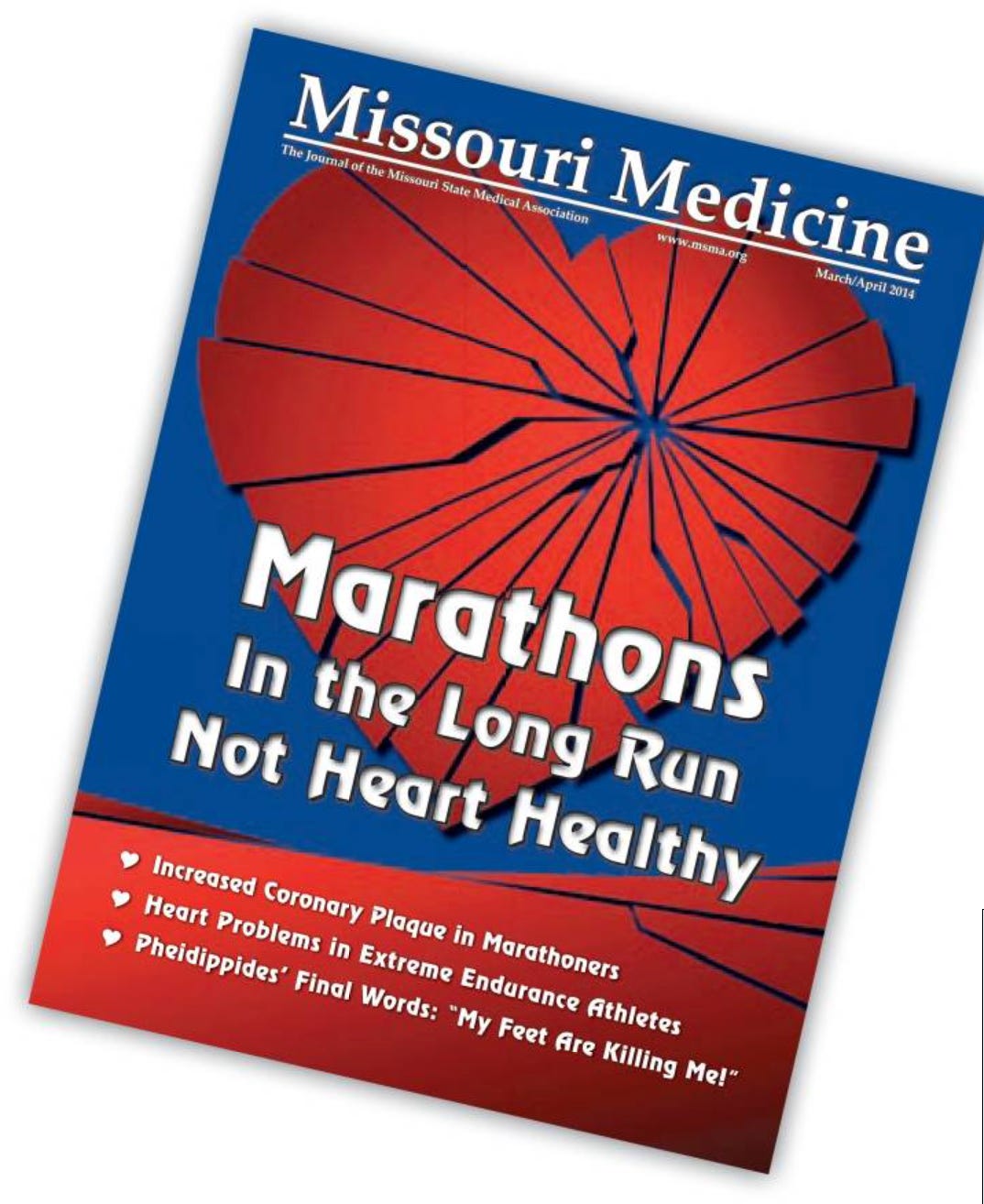



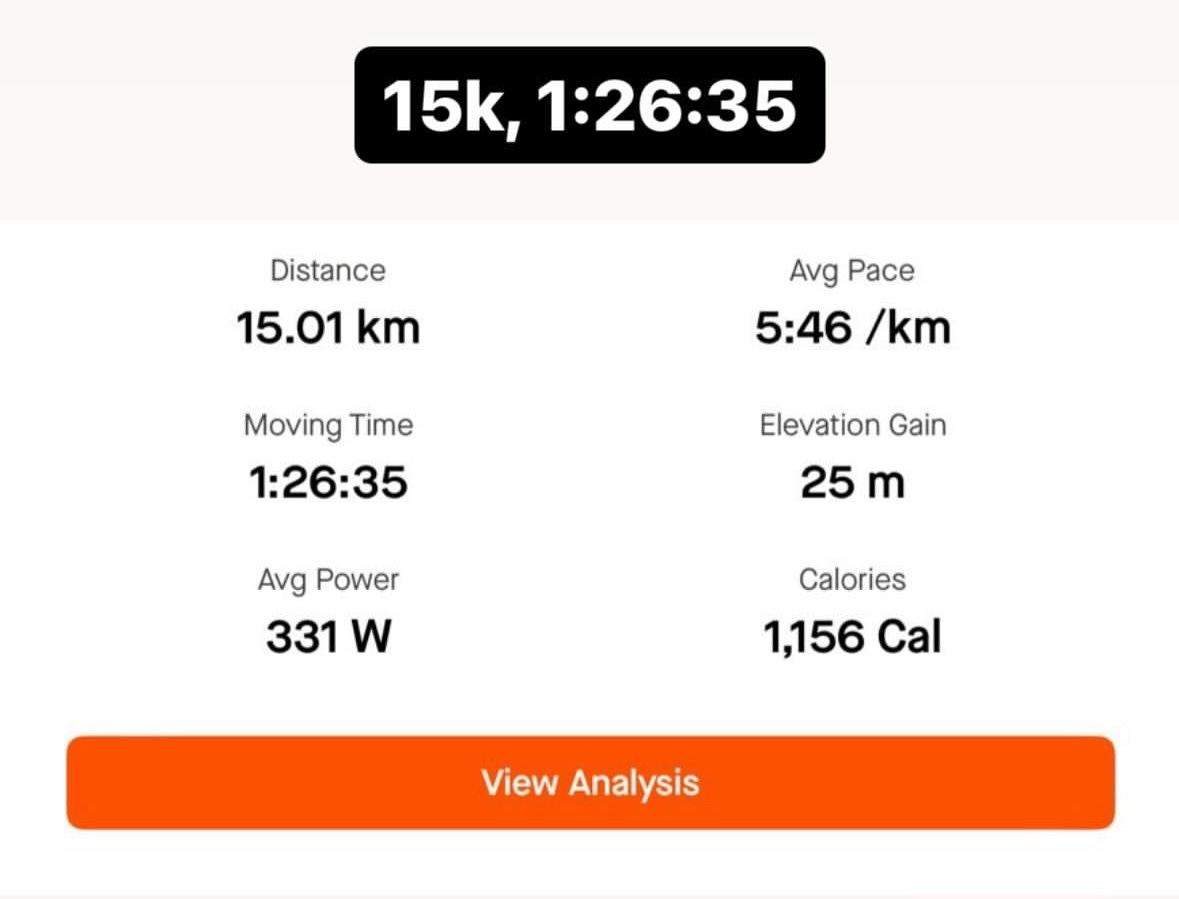



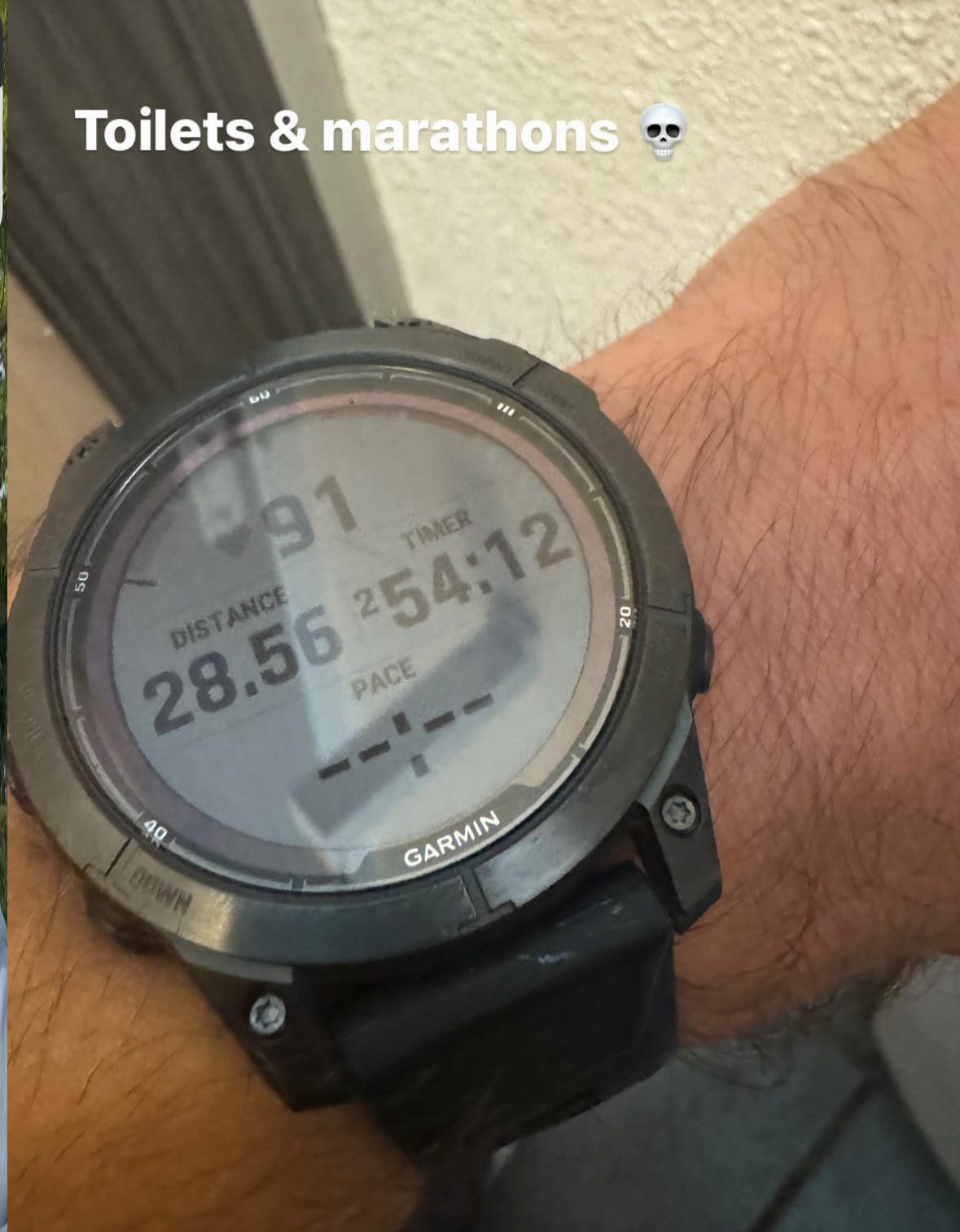

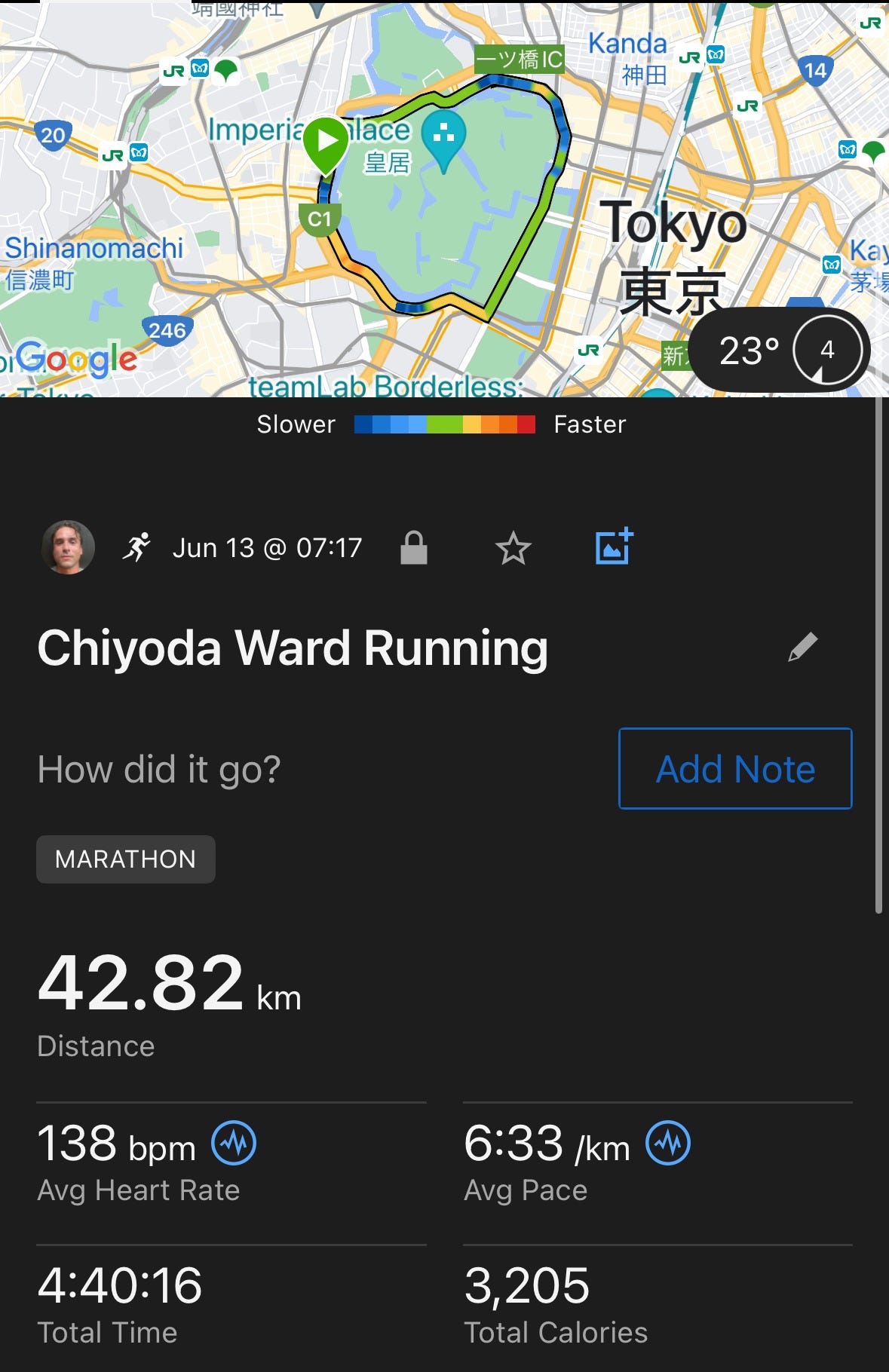



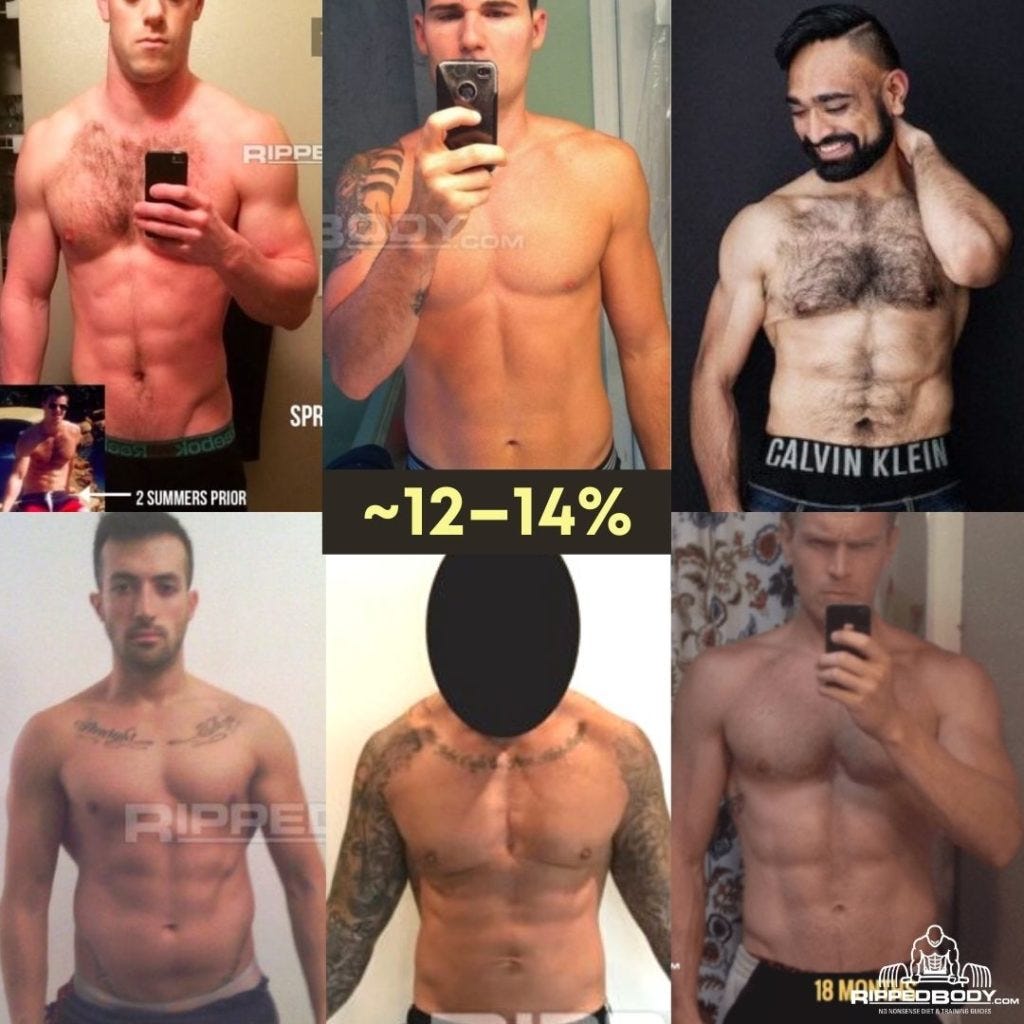




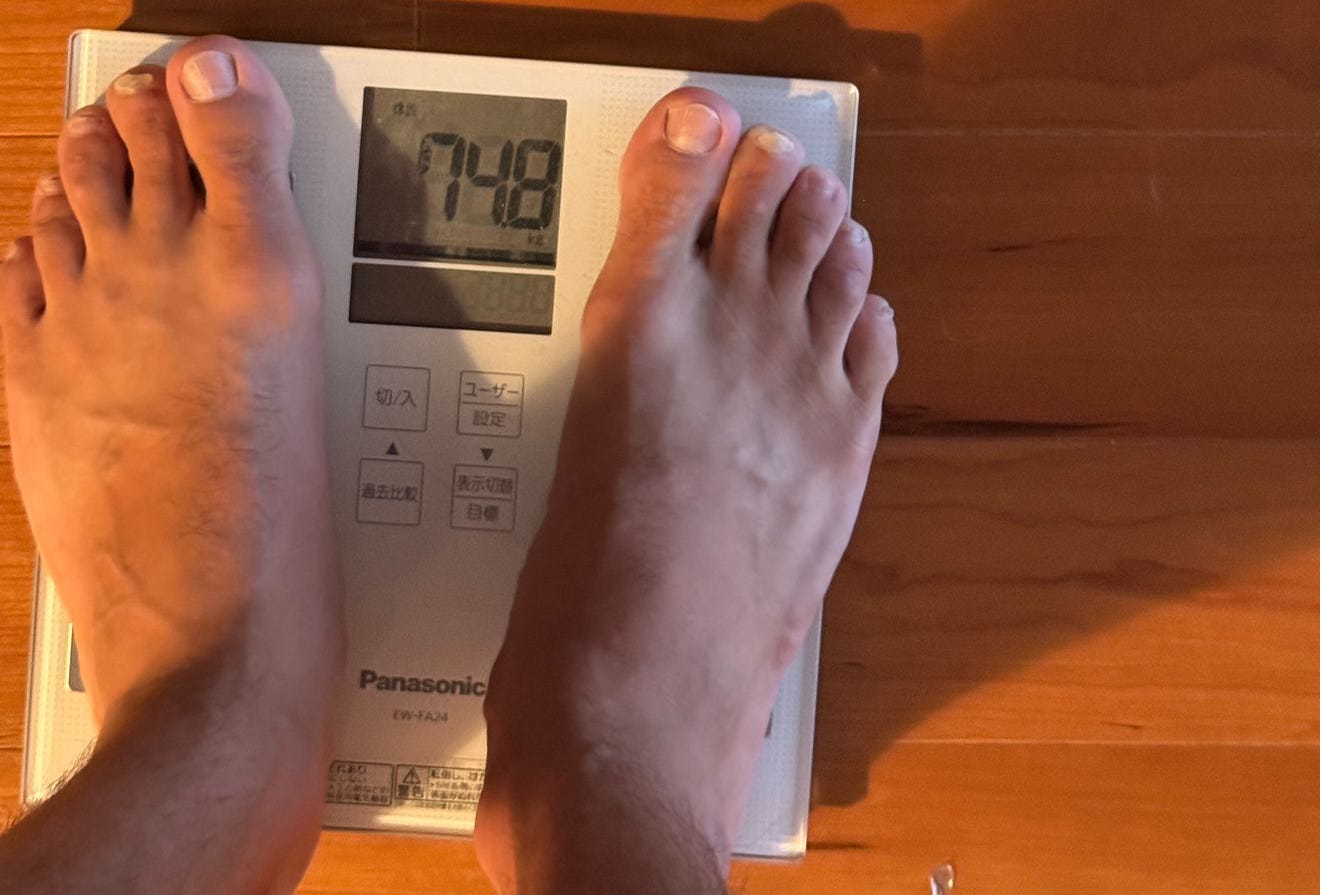
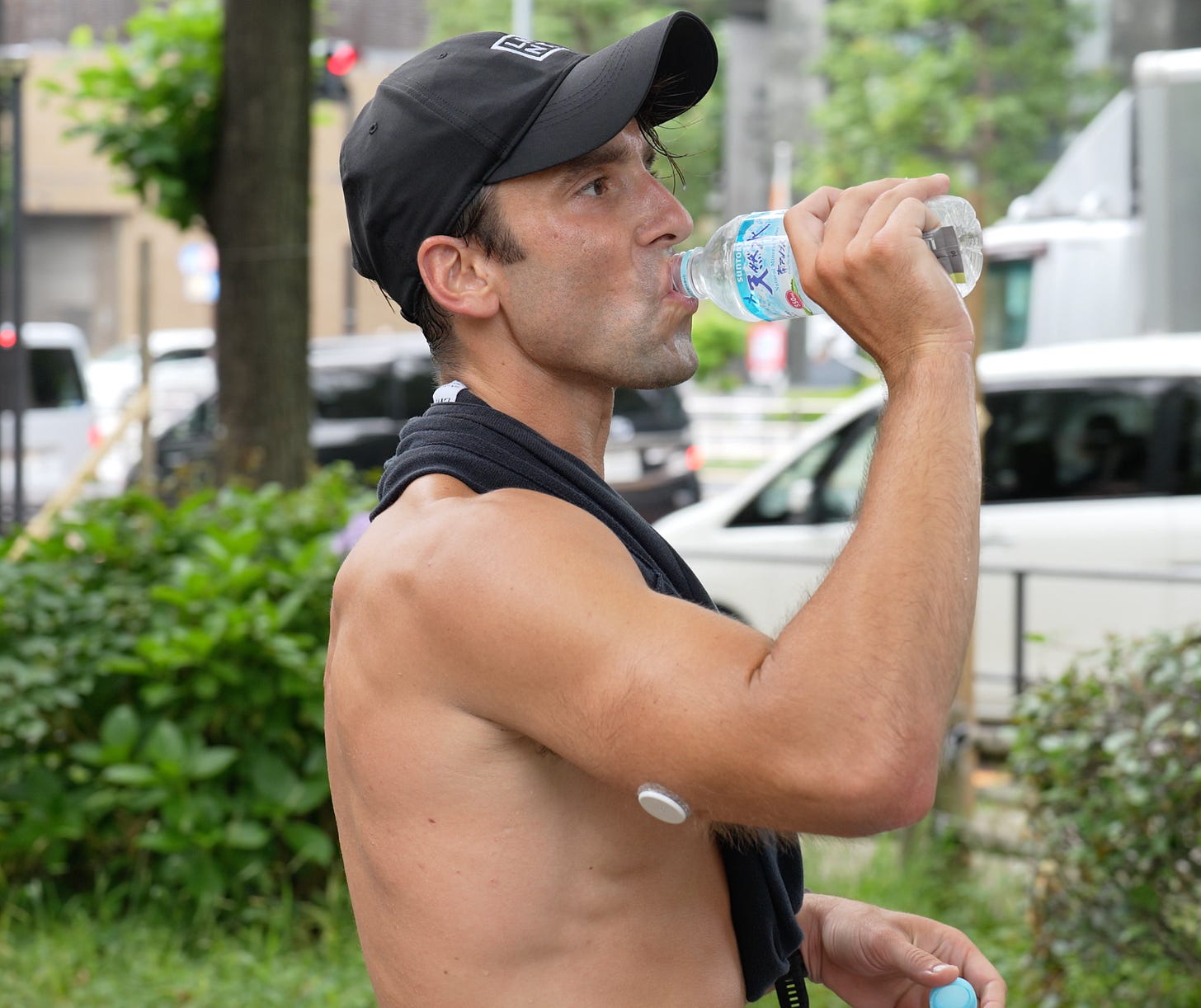


















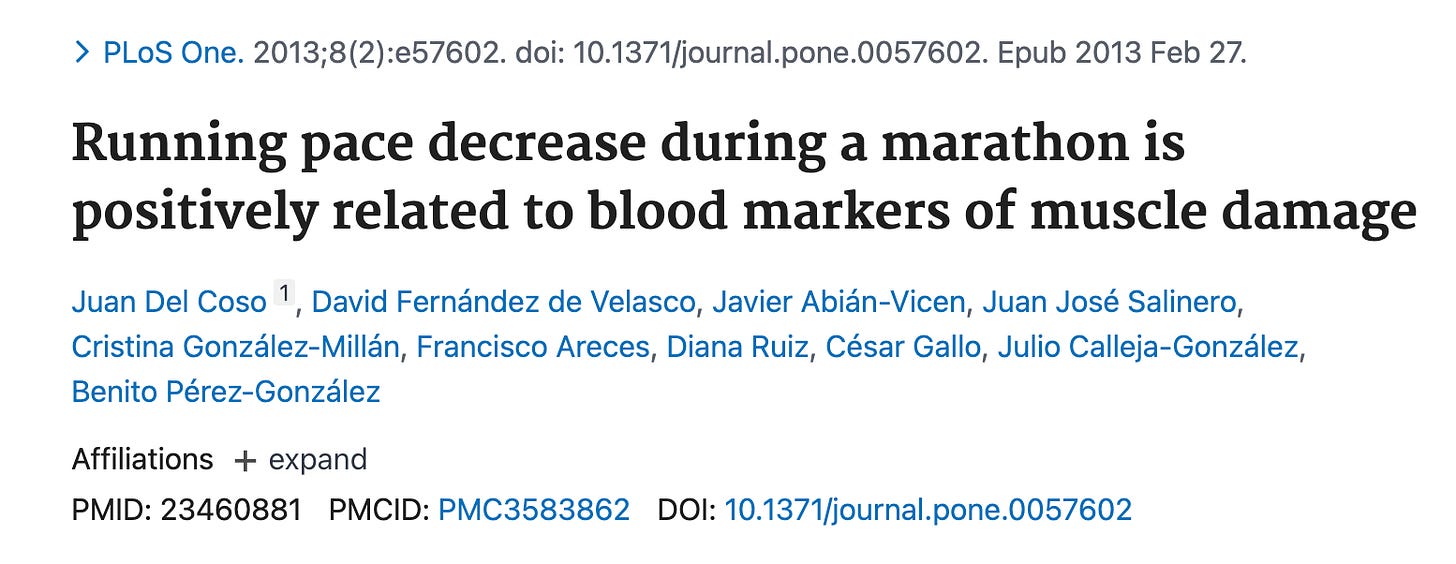

That 2015->2017 difference is honestly a stranger on the streets difference. Quite amazing what can happen in just 2 years even past adolescence!
Most surprising how well the human body manages to maintain a level blood sugar level like that. Almost like it's what it's built for.
Good luck with the workshop! 🙏
”Honestly, I was quite cranky and irritable the two days following the marathon. "
Having recently done a bakagaijin maneuver in the mountains, this explanation inadvertently came at the right time! 😅
Honestly, I'd be interested on the performance increase of mitochondrial interventions on a further fasted marathon, Since ketosis already has positive mitochondrial adaptations.
Although, there would be some carry over from Zone 2 training, it would still be interesting to see. Something like a 6 month regime of:
Ketosis diet
2x weekly two-Hour Zone two cardio
1x weekly sprint session
Methyline Blue
NAC
Glycine
TMG